Key takeaways:
- Noise control engineering focuses on reducing unwanted sound to improve environments in various settings, positively affecting well-being.
- Minimalist living emphasizes decluttering, valuing quality over quantity, and simplifying routines for enhanced mental clarity and deeper connections.
- Strategies like the “one in, one out” rule and mindful purchasing can support a minimalist lifestyle and foster self-awareness.
- Personal experiences highlight the transformative effects of minimalism, including reduced stress and a strengthened sense of self.

What is noise control engineering
Noise control engineering is the discipline dedicated to reducing unwanted sound and enhancing the acoustic environment. It involves evaluating sound properties and designing systems or materials to prevent excessive noise levels in various settings, from industrial sites to residential areas. Have you ever experienced the relief of a quiet space after a long day? That tranquility is often a result of effective noise control techniques.
I remember working on a project where we had to mitigate noise from heavy machinery in a factory. It was fascinating to see how sound barriers and absorptive materials transformed the environment, leading to a more peaceful workspace. This field isn’t just about technical specs; it’s about creating spaces where people can thrive without the distraction of noise pollution.
At its core, noise control engineering combines acoustics, material science, and design principles. Each project offers a unique challenge, making me question not just how we can block sound, but also how we can shape experiences. Isn’t it intriguing to ponder how sound influences our emotions and productivity?
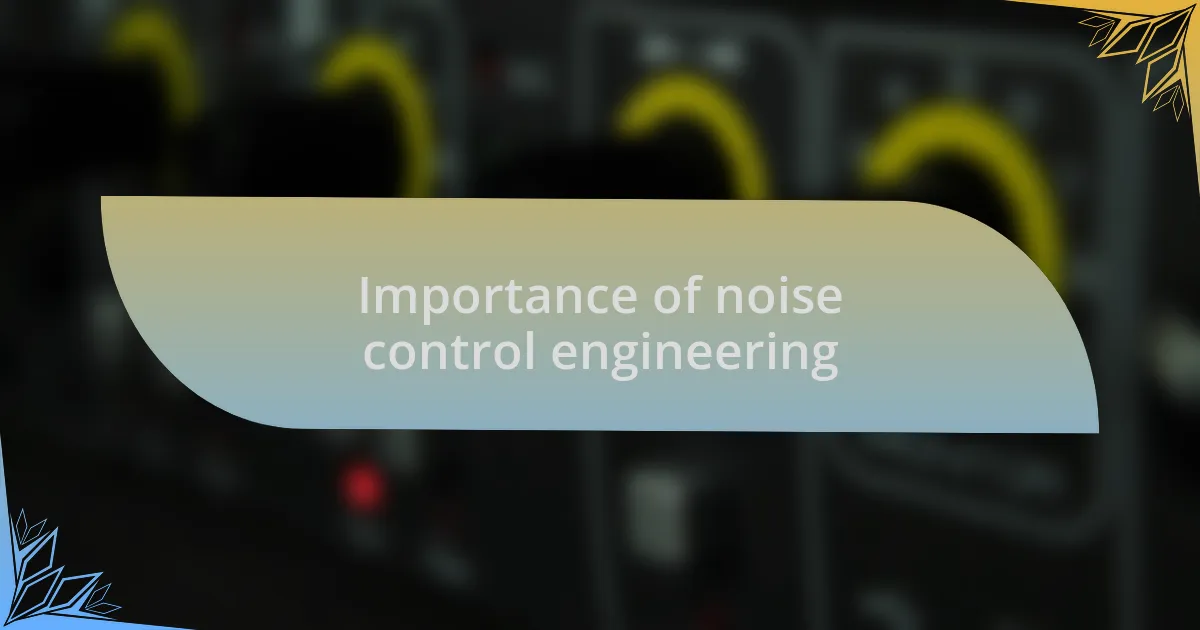
Importance of noise control engineering
Noise control engineering plays a crucial role in our increasingly noisy world. I recall visiting a bustling urban area where construction noises created chaos, making it nearly impossible to converse. That experience highlighted how effective noise control can significantly improve our daily interactions and overall quality of life.
When we consider the impact of sound on our health, noise control becomes even more vital. Studies link prolonged exposure to excessive noise with stress, sleep disturbances, and other health issues. I’ve witnessed how implementing noise reduction solutions in office environments not only enhances concentration but also boosts employee morale, leading to happier, more productive teams.
The importance of noise control engineering extends far beyond aesthetics; it shapes our environment and influences our well-being. Every successful project I’ve been part of reinforced the idea that creating quieter spaces fosters a sense of calm and encourages deeper connections among people. How often do we underestimate the power of sound until it abruptly affects our experience?
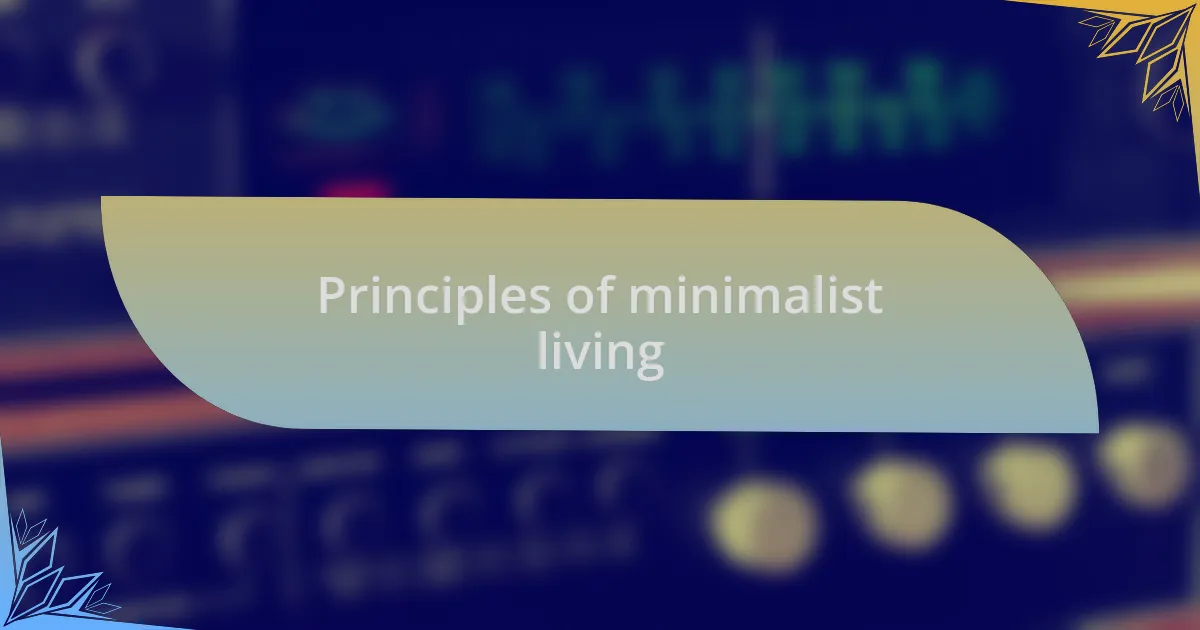
Principles of minimalist living
One core principle of minimalist living is the intentional focus on what truly matters. I vividly remember a time when I held onto items that had little significance, only to realize later that they cluttered my space and mind. By prioritizing the essentials, I’ve found that my environment invites clarity and peace. Isn’t it remarkable how shedding the unneeded can transform your daily experience?
Another key tenet is the commitment to quality over quantity. For instance, when I decided to invest in a few high-quality items rather than an abundance of cheaper alternatives, I noticed a profound shift. Not only are these possessions more durable, but they also carry stories and meaning that enrich my life. Have you ever stopped to consider how a well-made item can evoke a sense of pride and satisfaction?
Lastly, embracing simplicity in daily routines is paramount. I often reflect on how complex schedules add stress rather than fulfillment. By streamlining my activities and focusing on fewer, more rewarding engagements, I’ve discovered a newfound appreciation for each moment. How does simplifying your day-to-day tasks impact your overall happiness? For me, it creates space for genuine connection and mindfulness, allowing life’s beauty to shine through.
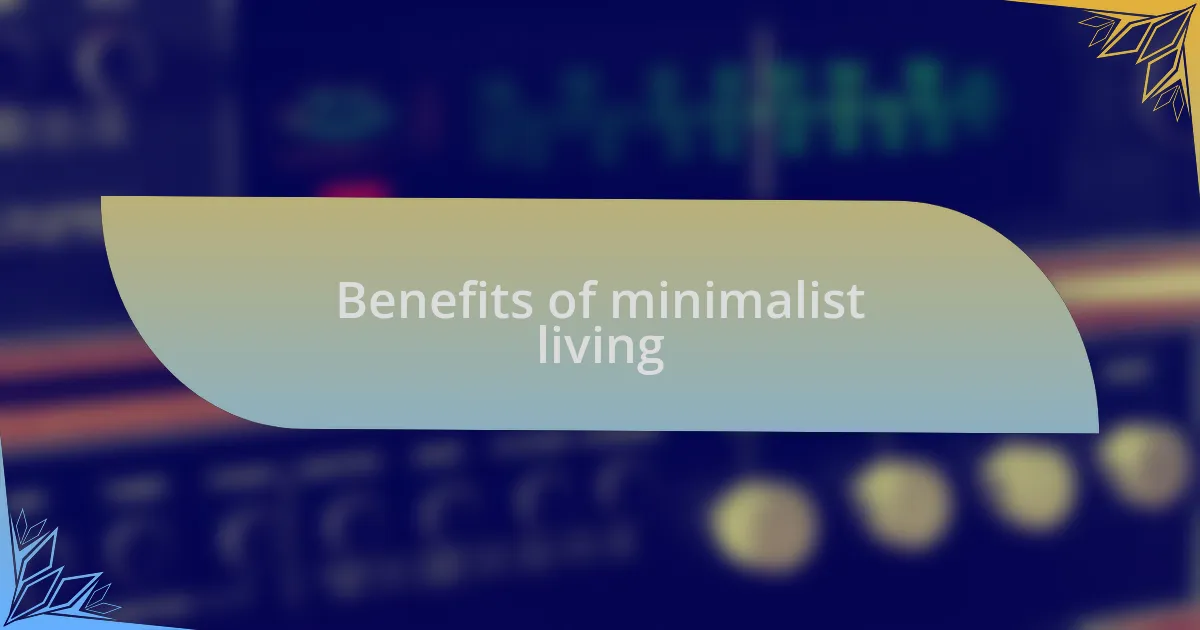
Benefits of minimalist living
Minimalist living has profoundly enhanced my mental well-being. I remember a time when my surroundings were filled with unnecessary clutter, resulting in a constant state of overwhelm. Once I embraced minimalism, I felt an immediate sense of calm. Have you ever experienced that release when you finally let go of items that no longer serve you? The freedom that comes from decluttering is truly transformative.
Another significant benefit I’ve encountered is financial clarity. In the past, I would indulge in impulsive purchases that only added to my stress. By focusing on what I really need, I’ve managed to save money and allocate my resources more wisely. Isn’t it empowering to track your spending when you’re no longer chasing after things you don’t truly want?
Minimalism has also allowed me to cultivate deeper relationships. With fewer distractions in my life, I’ve noticed a marked improvement in my ability to connect with others. One evening, I spent hours talking with a friend, free from the incessant tug of notifications or unimportant tasks. Doesn’t it feel great to be present with someone you care about without the pull of clutter? Ultimately, I cherish these moments more than any object I could own.
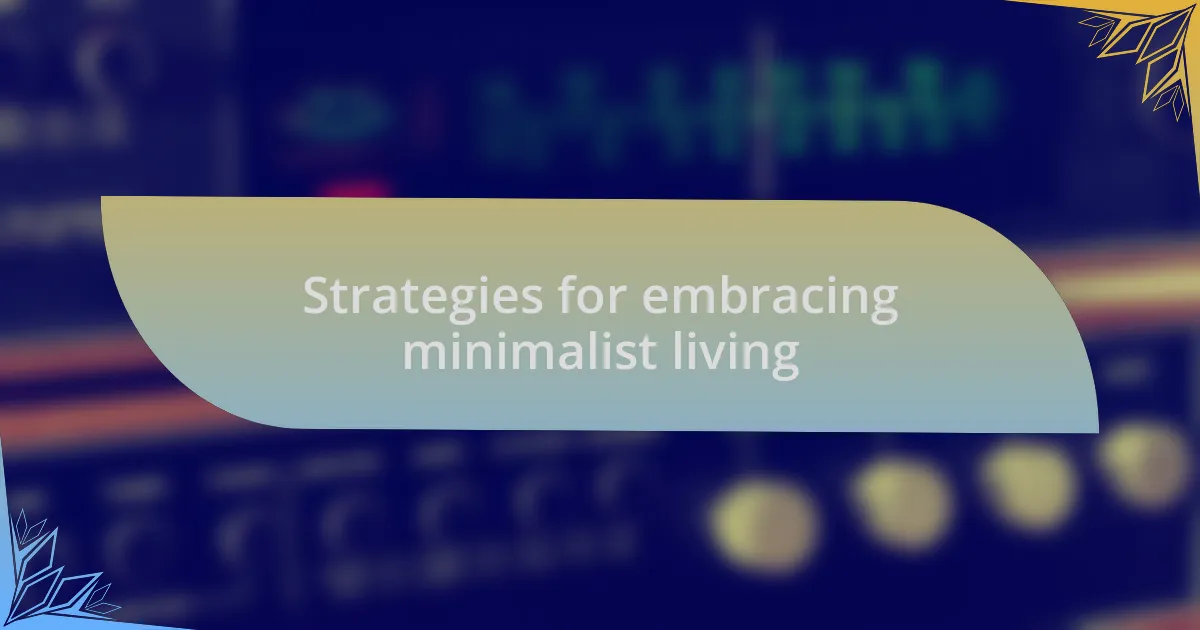
Strategies for embracing minimalist living
One effective strategy I adopted was the “one in, one out” rule. Whenever I consider bringing a new item into my home, I make it a point to let go of something I already own. This simple approach not only curbs my impulse to accumulate more but also reinforces my commitment to a minimalist lifestyle. Have you ever felt the weight lifted when you decluttered in this way? It’s a continual reminder that less truly can be more.
Another strategy that worked wonders for me was to set specific limits on my possessions. For instance, I chose to keep only a certain number of books or clothes, which pushed me to be intentional about what I really cherished. The process of reassessing my belongings was eye-opening; I discovered items that once held significance but had since lost their value. How often do we hang onto things simply because they’ve been with us for too long?
Mindfulness also plays a crucial role in my minimalist journey. I began practicing awareness during shopping trips, asking myself why I felt compelled to buy something. Instead of mindlessly adding to my cart, I now reflect on whether the item will genuinely add value to my life. By cultivating this self-awareness, I’ve found that my interactions with material goods have shifted dramatically. Have you tried being more mindful about your purchases? It’s a rewarding practice that truly enhances the minimalist experience.
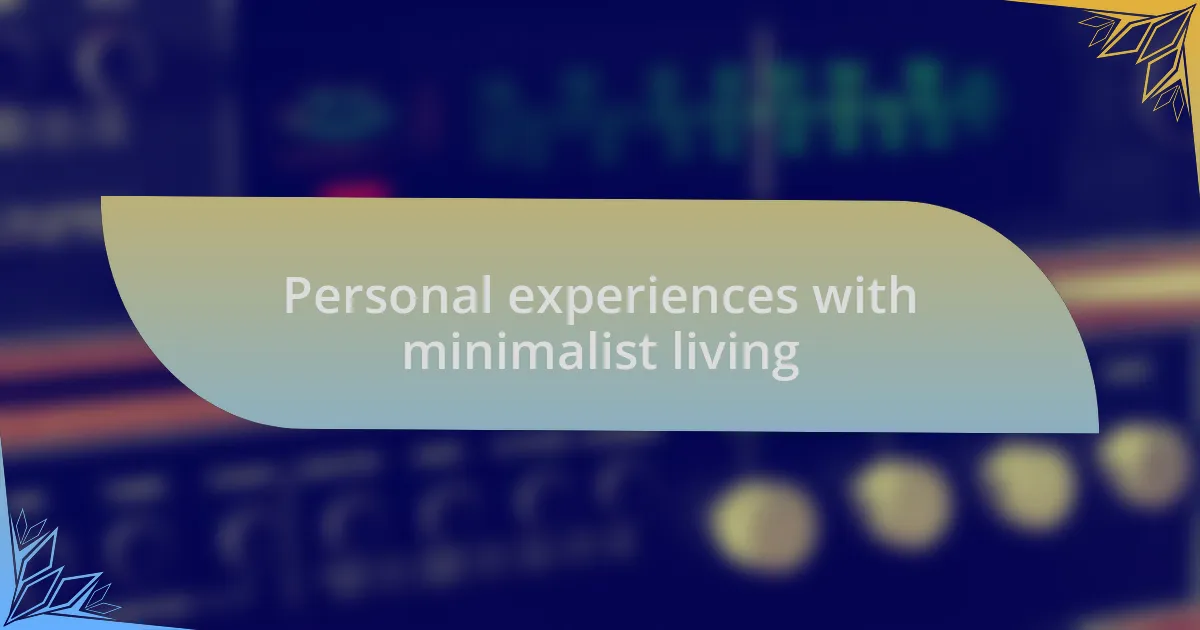
Personal experiences with minimalist living
One of my most striking experiences with minimalist living happened when I decided to downsize my wardrobe. I remember standing in front of my closet, overwhelmed by the sheer number of clothes I had accumulated over the years. As I sifted through each piece, I felt a mix of nostalgia and relief. Letting go of items that no longer represented who I was allowed me to reconnect with my true style. Could it be that our possessions often define how we see ourselves?
Another profound moment was during a weekend getaway to a small cabin in the woods. The absence of clutter in that space made me realize how little I needed to feel content. For the first time in ages, I experienced a blanket of calm that contrasted sharply with the chaos of my everyday life. It made me wonder: why do we so often equate our happiness with our possessions?
In the early days of my minimalist journey, I faced a strong wave of resistance—both from myself and my surroundings. As I shared my decision with friends and family, some voiced their concerns about my lifestyle change. The emotional push and pull were hard to navigate, but ultimately, I found that skepticism often came from a place of misunderstanding. Have you ever felt the challenge of breaking free from societal expectations? Embracing minimalism has not only transformed my physical space but also reinforced my commitment to living authentically.